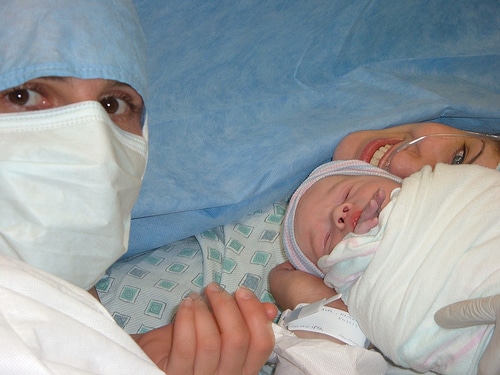 Culture & Ethics
Culture & Ethics
 Evolution
Evolution
 Human Origins
Human Origins
All Figured Out: How Human Monogamy Evolved

Ladies, if you feel secure in your marriage, confident that your husband is the loyal, monogamous type, why then for that blessing you can go ahead and thank an ancient heritage from our ancestral past: that of infanticide. The clever Darwinian evolutionists who authored a new article in the Proceedings of the National Academy of Sciences, “Male infanticide leads to social monogamy in primates,” have got this all figured out.
The idea is that monogamy in humans and other primates evolved as a response to the threat of males killing babies at the breast, the latter being a reproductive strategy for hurrying up the female’s return to fertility. Once the father starts sticking around, the threat is obviated, carrying along with it associated benefits:
The origin of social monogamy in primates is best explained by long lactation periods caused by altriciality, making primate infants particularly vulnerable to infanticidal males. We show that biparental care shortens relative lactation length, thereby reducing infanticide risk and increasing reproductive rates. These phylogenetic analyses support a key role for infanticide in the social evolution of primates, and potentially, humans.
I love this bit of empty swagger in a comment by the lead author, anthropologist Kit Opie:
This is the first time that the theories for the evolution of monogamy have been systematically tested, conclusively showing that infanticide is the driver of monogamy. This brings to a close the long running debate about the origin of monogamy in primates.
Simple as that — open and shut. This is notwithstanding that another study, published the very same day (July 29) in Science (“The Evolution of Social Monogamy in Mammals“), advances a totally different theory: monogamy as a “mating strategy.”
The evolution of social monogamy does not appear to have been associated with a high risk of male infanticide, and paternal care is a consequence rather than a cause of social monogamy. Social monogamy has evolved in nonhuman mammals where breeding females are intolerant of each other and female density is low, suggesting that it represents a mating strategy that has developed where males are unable to defend access to multiple females.
One of the two authors of the other study, Tim Clutton-Brock, doubts that humans are naturally monogamous at all:
It is debatable whether humans should be classified as monogamous. Because all the African apes are polygamous and group living, it is likely that the common ancestor of hominids was also polygamous.
That much, anyway, rings true. Our colleague Wesley J. Smith, commenting on the article in PNAS, observes smartly at National Review Online:
Monogamy did not “evolve.” It exists because of human exceptionalism.
Here’s what I mean: Geese don’t “choose” to mate for life and felines don’t “cat around” because they are immoral. They have no choice in the matter. Their mating methods are instinctual.
In contrast, human societies have differed widely over views on sex and commitment to monogamy, with more ancient societies and some current cultures permitting polyamory. That’s because human cultural norms are not biologically determined, as in animal behavior.
Rather, humans have free will. We create, socialize, and enforce moral and ethical codes. In this sense, we are not slaves to impersonal evolutionary forces in our romantic lives. Indeed, the breathtaking refashioning of Western sexual morality just during my lifetime is a vivid example.
Extended lactation and altriciality — the need of helpless human young to be cared for by a parent or parents for years — are a function of nature. Monogamy is a choice, as anyone who follows the news or simply keeps his eyes open a bit will tell you. “Let’s get real,” urges Wesley. Yes, let’s.
Image credit: IrishMBO/Flickr.
